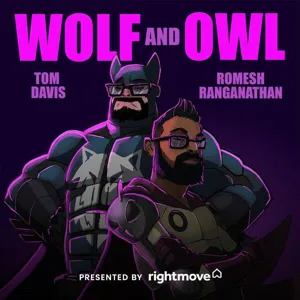Podcast Summary
Exploring the Value of Psychology in Personal Growth: Listeners can gain insights and comfort from personal stories and psychological concepts, helping them navigate life's challenges.
The podcast episode, despite the speaker's initial frustration with a malfunctioning vape, manages to provide comfort and relatability to listeners through sharing personal experiences and exploring psychological concepts. Last week's episode, which discussed grief, unexpectedly resonated with many listeners dealing with loss. This week, the podcast will focus on a particular school of psychology and how it has helped the speaker personally, with the hope that listeners may find value in it as well. Additionally, the speaker is looking forward to a live podcast interview at the Vodafone Comedy Festival with comedian Greg Tarkington.
Understanding negative patterns in communication and relationships through transactional analysis: Transactional analysis provides insights into past experiences and unconscious motivations behind negative patterns in communication and relationships, helping individuals work towards healthier, more fulfilling interactions.
Transactional analysis is a form of psychotherapy that can help individuals understand and address negative patterns in their communication and relationships. Developed in the 1960s by Eric Berne, it's a later incarnation of Freudian psychoanalysis. It suggests that people's behaviors, even if they seem irrational, often stem from past experiences and unconscious motivations. If you find yourself repeatedly making the same negative mistakes in relationships or feeling small and frustrated after interactions, transactional analysis might offer insights into the reasons behind these patterns. By understanding the underlying dynamics, you can work towards healthier, more fulfilling relationships and improved mental health.
Childhood experiences shape our ego states: Understanding and managing our ego states can improve mental health and relationships. Spend more time in the adult ego state for rational responses.
Our behaviors and reactions to situations are largely influenced by our childhood experiences, and these patterns can negatively impact our mental health and relationships. Transactional analysis, a psychological approach, identifies three ego states: child, parent, and adult. The child ego state is based on childhood experiences, the parent ego state is characterized by critical and judgmental behavior learned from parents or authority figures, and the adult ego state is the rational, here-and-now response. Spending too much time in the child or parent ego states can lead to irrational behaviors and poor mental health. For example, getting angry at a driver who cuts in front of you and switching into a critical parent ego state can cause unnecessary stress and negatively impact your day. The goal is to strive for living in the adult ego state as much as possible for effective and healthy responses to life's challenges.
Understanding Different Ego States: Awareness of different ego states, rooted in childhood experiences, can help us communicate effectively and respond appropriately in various situations.
Our behaviors and responses throughout the day can shift between different ego states, including child and parent, often in response to conflict or feelings of shame or fear. These ego states, rooted in childhood experiences, can influence how we communicate and interact with others. For example, if we feel embarrassed or threatened, we might revert to a child ego state and behave immaturely or sulk. Alternatively, if we feel defensive or in a position of authority, we might slip into a parent ego state and become critical or punishing. Understanding these ego states and how they manifest in our daily transactions can help us become more aware of our reactions and communicate more effectively with others.
Regressing to Childlike Ego States in Conflicts: During conflicts, avoid regressing into childlike or parental ego states by taking responsibility for our actions and focusing on resolving the issue rather than seeking past affection and acceptance.
During arguments or conflicts, people often regress to childlike ego states, unconsciously making the other person a stand-in for their parents. This behavior is not an effective way to win arguments or resolve conflicts, but rather a way to unconsciously seek affection and acceptance from past relationships. The parent ego state, where we reenact speech, body movements, opinions, and views of our past parent figures, can be identified through body language and recurring themes. Instead of focusing on the other person's behavior during conflicts, it's essential to take responsibility for our actions and avoid regressing into childlike or parental ego states. By doing so, we can foster healthier and more productive relationships.
Understanding ego states in relationships: Be mindful of child and parent ego states in relationships, aiming for balance and healthy communication to prevent toxic power dynamics and arguments
Our interactions with others often stem from our internal ego states, which include the child and parent states. The child state, which includes adaptive and free child, seeks approval and control, while the parent state, which includes controlling and nurturing parent, asserts authority and care. However, when these ego states become toxic, arguments and unhealthy power dynamics can arise. For instance, a woman might feel taken for granted and demand her partner to clean the dishes, triggering a defensive response from him. Both parties may then resort to tantrums and verbal or physical aggression. It's essential to be aware of these ego states and strive for a balance between them, allowing for healthy communication and mutual respect in relationships.
Unconsciously seeking toxic relationships: To avoid toxic relationships, cultivate the adult ego state, express gratitude and appreciation, and seek self-reflection and therapy.
Toxic relationships can form when two people unconsciously seek each other out due to unresolved issues from their past. This dynamic can manifest in complementary transactions, where one person's controlling parent ego state triggers the other person's child ego state, leading to unhealthy patterns of behavior. For example, a person might be drawn to a partner who reminds them of their own unaccepted flaws or unresolved childhood issues. This can initially feel comforting, but over time, it can lead to resentment and hatred towards the other person. To avoid these toxic complementary transactions, it's important to cultivate the adult ego state, which focuses on the present and avoids winning or losing mentality. In the context of a disagreement over dishes, an adult conversation would involve expressing gratitude and appreciation for the effort put into making dinner, and offering to help without being asked. To achieve this adult state, self-reflection and therapy can be helpful tools. While finding a transactional analysis therapist may not be feasible for everyone, practices such as cognitive-behavioral therapy can help individuals become more aware of their own behavior and patterns of interaction. By recognizing and addressing our own child and parent ego states, we can build healthier and more fulfilling relationships.
Moving from a childlike state to an adult state: Cultivating self-confidence and assertiveness through understanding relationships and taking responsibility for actions and emotions leads to respect and improved social experiences.
Developing self-confidence and assertiveness are crucial components of moving from a childlike state to an adult state. The speaker shares his personal experience of struggling with social interactions due to low self-esteem and a lack of assertiveness, which left him in a vulnerable position where people either nurtured him or bullied him. He used transactional analysis as a tool to understand the dynamics of relationships and the importance of taking responsibility for one's actions and emotions. An adult ego state is characterized by assertiveness, the ability to admit when one is wrong, and the confidence to say "no" without apology. By cultivating these qualities, individuals can gain respect and improve their social experiences. Additionally, it's important to note that individuals can be in multiple ego states at once, and it's not necessary to resort to extreme behaviors to express assertiveness. Instead, compassionate and confident communication is the key to effective and respectful interactions.
Expressing anger indirectly through passive aggression: Passive aggression is a childish behavior where individuals express anger and hurt indirectly, often due to deeply held beliefs or life scripts, and can cause harm to relationships if not addressed
Passive aggression is a form of childish behavior where individuals express their anger and hurt in indirect ways, often justifying it as adult behavior. This happens when the child ego state motivates the parent ego state to punish or hurt others, rather than expressing emotions directly. This behavior can stem from deeply held beliefs or life scripts formed in childhood, which individuals may not question or challenge. Instead of physically hurting someone or expressing aggression openly, passive aggression can manifest as withholding communication, giving the silent treatment, or engaging in manipulative behaviors to make the other person feel hurt. It's essential to recognize and address these patterns to prevent causing harm to relationships and promote healthy communication and emotional expression.
Our internal life scripts shape how we perceive ourselves and the world: Understanding our deeply ingrained scripts can help challenge them against reality and make more intentional choices in life.
According to transactional analysis in therapy, we all have an internal script for our lives that shapes how we perceive ourselves and the world around us. This script, which is often formed during childhood, can significantly impact our beliefs, behaviors, and emotions. It's like a personal narrative that we've unconsciously written for ourselves, complete with different characters and a rigid way of seeing things. The experiences we have as children, especially those with our parents, can shape the title, tone, and themes of our life story. For instance, if we grew up with a critical parent, our script might dictate that we must be perfect all the time, leading to feelings of failure and unhappiness when we fall short. Alternatively, if we grew up in a household with unloving or dysfunctional parents, our script might tell us that love doesn't exist or that human interaction is inherently difficult. These deeply ingrained scripts operate outside of conscious awareness and can influence our decisions and actions, sometimes leading us to self-fulfilling prophecies. So, take some time to reflect on your own life story. What's the title? Is it a happy or sad tale? Understanding our scripts can help us challenge them against reality and make more intentional choices in life.
Unconscious scripts shape our behavior: Unconscious scripts formed during childhood influence our self-perception and relationships, often leading us to reinforce negative beliefs. Recognizing and challenging these scripts can help improve behavior and relationships through therapy like transactional analysis.
Our unconscious mind shapes our behavior through negative scripts, which we may not be aware of. These scripts, often formed during childhood, influence how we perceive ourselves and others, and can unconsciously guide us towards situations that reinforce these negative beliefs. For instance, if a script is "I am unlovable," we may unconsciously sabotage relationships or push people away. The more stressed we are, the more likely we are to respond to stress by living out our script rather than as an adult. It's important to recognize these scripts and challenge their validity in the present reality. Through therapy like transactional analysis, we can identify and work to change these limiting beliefs. The scripts we form are not necessarily positive or negative, but rather, their realism in relation to our actual lived experiences. Some common scripts include "I'm not okay, you're okay," "I'm okay, you're not okay," and "I'm not okay, you're not okay," each with distinct characteristics and challenges. Understanding these scripts can help us better understand our own behavior and relationships.
Moving past limiting scripts: Recognize and challenge limiting scripts from the past to live fully in the present, using tools like transactional analysis, cognitive behavioral therapy, and psychoanalysis.
We all carry scripts from our past that may not serve us well in the present. These scripts can limit our interactions with the world and prevent us from truly living in the here and now. To move past these limiting scripts, we can adopt a new, healthy script: "I'm okay. You're okay." This script acknowledges our intrinsic value and equality as human beings, allowing us to respond to challenges in a flexible and adaptive way. Tools like transactional analysis, cognitive behavioral therapy, and psychoanalysis can help us understand and confront the root causes of our limiting scripts, ultimately leading to personal growth and happiness. It's important to remember that everyone's journey is unique, and what works for one person may not work for another. But by being open to new ideas and approaches, we can continue to evolve and improve our lives.
Happiness from within: True happiness comes from self-understanding, living in the present, and focusing on the process, not the end result. Accept pain and react healthily.
True happiness cannot be attained through external means such as money or power. Instead, it comes from understanding oneself, living in the present moment, and focusing on the process rather than the end result. Happiness is not a constant state, and accepting pain and reacting to it in a healthy way is essential. Jordan Peterson, an expert in clinical psychology, shares similar views on self-help and psychology, but it's essential to separate his opinions on other topics from his expertise. To support this podcast, listeners can contribute through Patreon.com/theblindbypodcast.
Expanding the Podcast with Anonymous Submissions: Listeners can submit anonymous queries for an 'agony aunt' segment on Snapchat, with the host promising confidentiality. The host also mentioned the need for visual aids for complex discussions and promoted UnitedHealthcare TriTerm Medical plans.
The podcast host is expanding the scope of his show to include anonymous submissions for an "agony aunt" segment, where he will discuss and provide advice on listeners' personal situations. He suggested using Snapchat for true anonymity, as users often don't reveal their full identities on the platform. The host also mentioned that he won't reveal the identities of those who submit questions or situations, even if they tell him. Additionally, he expressed that the complex transaction analysis discussed in the podcast would have been better presented with visual aids like PowerPoint and diagrams. The host will be back with the same time next week, and encouraged listeners to engage with the new segment by sending their anonymous queries through Snapchat, Twitter, or Patreon. The host also reminded listeners about the importance of having health insurance, and promoted UnitedHealthcare TriTerm Medical plans for their flexible and budget-friendly coverage that lasts nearly 3 years in some states.





